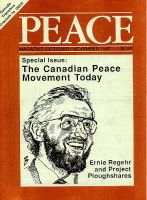
Peace Magazine Oct-Nov 1987, page 11. Some rights reserved.
Search for other articles by Karen Gaudun here
FROM EAST TO WEST, SUPPORT IS MOUNTING FOR CANADIAN Nuclear Weapons Free Zones (NWFZs). As of August 7, Canada had 166 NWFZs, including the provinces of Ontario and Manitoba and the Northwest Territories. Almost 60 percent of the Canadian population lives in an officially declared NWFZ. A campaign is underway to have B.C. declared one also It is proceeding on three levels -- public education, municipality support, and lobbying and educating politicians. The campaign has encouraged municipalities to become NWFZs themselves. As a result, the number of NWFZs has risen in B.C., so that now, almost 60 percent of B.C. residents live in NWFZs. Another popular device has been the "adopt an MLA for peace" program. Meeting with local MLAs, campaigners have shared their concerns and their information on the nuclear issue, encouraging MLAs to publicly support the campaign. In Saskatchewan, a NWFZ campaign is being coordinated provincially by Project Ploughshares, the Interchurch Uranium Committee, and the Regina Coalition for Peace and Disarmament. Of particular concern to Saskatchewan residents are the issues of low-level flight teeing which occurs in Northern Saskatchewan, and uranium mining -- essential for the production of nuclear weapons. That campaign is working to establish solid grassroots support by encouraging individuals to declare themselves, their homes, businesses, and churches NWFZs. As of this writing, Ontario activists are still involved in the upcoming (September 10th) provincial election. Although Ontario was declared a NWFZ on November 13, 1986, many discrepancies still exist between the declared intent and the reality, which includes nuclear weapons related production, potential tritium export, low-level bomber flights, and nuclear warship visits. In order to make Ontario truly nuclear weapons free, provincial candidates will be asked to put some teeth into the resolution. One significant proposal is the Planning Act amendment, which would prevent Ontario companies from entering into new contracts for the production of nuclear weapons related products. The Nuclear Weapons Free Ontario Committee is in touch with activists in all 130 ridings who are asking candidates eight questions on the issues. Prior to election day, the results will be made public and then the politicians in the newly formed legislature will be made accountable.
Montréal is making valuable contributions to the Canadian NWFZ scene. After the city was declared a NWFZ in December of 1986, a peace committee of six councillors was formed with a mandate to report back to Council in six months on nuclear weapons involvement within Montréal. Since then, the committee has been working with peace and citizens groups throughout the city, exploring such issues as Montréal's ties with weapons manufacturers and the ways in which by-laws might be used to enforce the city's NWFZ status. Recently, the committee contacted the other 165 Canadian Nuclear Weapons Free Zones in order to learn about and compile a file on the various NWFZ initiatives that have been taken throughout the country.
When will Canada join its provinces and municipalities in declaring a Canadian Nuclear Weapons Free Zone? A new Project Ploughshares working paper suggests that the policy changes required to make Canada a truly NWFZ are significant but not as extensive as we might imagine. In fact, many of the changes necessary are simply logical extensions of policies that are already in place.
Another major project is the "National Association of NWFZ Municipalities" is being formed by Toronto councillor Jack Layton and Montréal Councillor, Pierre Goyer. Their purpose is to provide a forum for members to share information and ideas on the roles of NWFZs, how to create by-laws, effective follow-up activities, and the basic questions and concerns which arise when a municipality considers a NWFZ declaration. Information about these and other initiatives is available from the NWFZ Clearinghouse at the Peace Research Institute -- Dundas, 25 Dundana Ave., Dundas, Ont. L9H 4H5. Phone 4l6 628-2356.

Peace Magazine Oct-Nov 1987, page 11. Some rights reserved.
Search for other articles by Karen Gaudun here